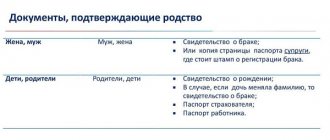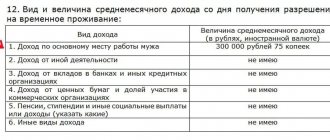9
One of the grounds for the emergence of the right to receive the property of the deceased owner is the presence of a blood connection. However, the fact of a family relationship must be documented. Data about family relationships may be lost, damaged, or contain errors, corrections, or typos. In such cases, it is necessary to obtain a duplicate. If it is impossible to obtain a duplicate document, the heir will have to go to court. Let's consider how to establish the fact of a family relationship with the deceased.
Establishing the fact of kinship for inheritance
In order to issue a certificate of the right to inheritance according to the law, a notary, in accordance with Article 72 of the “Fundamentals of the Legislation of the Russian Federation on Notaries,” must check the death of the testator, the time and place of opening of the inheritance, the composition of the inheritance and its location.
The notary also determines the circle of heirs according to the law. To do this, it is necessary to check the relationship between the testator and the persons who submitted applications for inheritance, since the presence and degree of relationship with the testator is the basis for calling them to inherit by law.
Legal assistance in establishing family relations with the testator. Tel.+7 Telephone consultation
However, legal heirs may have a problem associated with the inability to confirm their relationship with the testator due to reasons such as:
- Loss of documents confirming family ties
- Impossibility of document recovery
- Inconsistencies and discrepancies in the documents
If the documents submitted to the notary lack at least one certificate, without which it is impossible to trace the chain of relationship between the deceased testator and the person who expressed the will to accept the inheritance (birth certificate, marriage/divorce, change of surname, etc.), such person cannot be called upon by a notary to inherit by law.
In practice, there are cases when, due to discrepancies and inconsistencies in documents, it is formally impossible to trace relationships even between very close relatives - siblings, parents and children. Such inconsistencies may have various reasons, for example, the presence of typos or spelling errors when indicating last names, first names or patronymics in documents, and other inaccuracies.
Establishing the fact of kinship in court is especially typical for cases of inheritance by persons included in the second, third and subsequent lines of inheritance, for example, great-nephews, aunts, uncles, cousins, brothers or their children, etc., or when the testator died at a fairly advanced age, and the discrepancies in the documents cannot be eliminated due to the failure to preserve the relevant archival data.
There are often cases when it is impossible to restore lost documents also due to failure to preserve vital records in the registry office archives and state archives.
So, in order to obtain the right to inheritance by law, it is necessary to confirm the fact and degree of relationship with the deceased . Without this, the notary will not include the applicant in the circle of legal heirs. When accepting an application from a person whose relationship with the testator cannot be traced, the notary explains to the applicant about the need to confirm the relationship in order to be included in the number of heirs.
There are two ways to confirm relationship with the testator:
- Obtaining duplicate certificates from civil registry offices (archives)
- Establishment of family relations with a deceased testator in court
The second (judicial) method can be used only if it is impossible to confirm the fact of kinship in another (extrajudicial) way , i.e. if it is impossible to restore lost documents. If the documents can be obtained independently, there is no need to go to court; moreover, the court will not accept such a statement, and the recovered documents must be presented directly to the notary to confirm the relationship with the deceased.
After the heir’s application to establish the fact of relationship with the testator is accepted for court proceedings, the notary who opened the inheritance case, as an interested person, is notified of the consideration of such a civil case.
According to the provisions of Article 41 of the “Fundamentals of the Legislation of the Russian Federation on Notaries,” this is the basis for the notary to suspend notarial actions within the framework of the inheritance case opened by him until the court makes a decision in the case establishing the fact of the applicant’s relationship with the testator.
If the relationship is not established in court and the application is rejected by the court, the notary will refuse to issue a certificate of inheritance to this person due to failure to confirm his status as the legal heir of the deceased.
Important: It is necessary to remember that even if the applicant for the inheritance does not have a documented relationship with the testator, the notary is obliged to register an application for acceptance of the inheritance by law and open an inheritance case.
The most important thing is to contact a notary with an application within the 6-month period from the date of death of the testator. Although there are no legal grounds for refusing to accept an application in this case, in practice there are often cases when notaries verbally refuse to accept an application if the relationship is not confirmed.
If a notary orally refuses to accept an application to accept an inheritance according to the law, citing non-confirmation of relationship with the testator,
request a reasoned written refusal . If the dialogue with a notary does not lead to the desired result, it is recommended to send him your application by mail (necessarily with a list of attachments), having previously certified your signature in the application from another notary .
In this case, the notary must either:
- accept the application and start an inheritance case;
- within 10 days, provide a written reasoned refusal to open an inheritance case.
Thus, the fact of timely contacting a notary with an application to accept the inheritance will be recorded, which will subsequently relieve the heir from the need to restore the deadline for accepting the inheritance if the process of establishing the fact of kinship in court is delayed and goes beyond the 6-month period for accepting the inheritance.
An unlawful refusal by a notary can be appealed in court in accordance with Chapter 25 of the Code of Civil Procedure of the Russian Federation. To file a complaint, it is advisable to contact a practicing lawyer who will competently defend your rights in court.
Lawyer on inheritance issues in St. Petersburg. Tel.+7 (812) 989-47-47 Telephone consultation
Summarizing the above, let us outline the main aspects:
- If it is impossible to directly document the relationship with the deceased testator, establishing the fact of family relations with him is possible only in court, since legally significant facts, including the establishment of family relations, are established exclusively by the court in a special proceeding
- The absence of documents confirming relationship with the deceased testator is not a basis for a notary’s refusal to accept an application for acceptance of an inheritance; such a refusal will be unlawful and can be appealed in court
- The court's acceptance of the heir's application to establish the fact of kinship with the deceased testator is the basis for suspending notarial actions in the inheritance case until the court makes a decision in the case of establishing the fact of kinship.
Why is it important to determine the fact and degree of relationship during inheritance?
As is known, on the territory of the Russian Federation, inheritance can be transferred by law or by will. In the first case, establishing the highest degree of family ties will allow you to win the largest part of the inheritance. So, for example, in the case of illegitimate children of the testator (if there are any), timely establishment of a relationship with the deceased will allow them to be considered heirs of the first priority. When registering an inheritance under a will, the heirs will need to establish the fact of relationship, for example, if the initials in a document or identity card do not match. Proof of kinship is important, both when registering an inheritance under a will, and in the case of inheritance by law, which involves accepting the inheritance in the order of priority.
Grounds for establishing the fact of family relations
- The court establishes only facts of legal significance, i.e. giving rise to the emergence, change or termination of rights. Establishing the fact of kinship without a specific purpose is impossible
- Relationship can be established by a court only if it is impossible to establish it in any other extrajudicial way, i.e. if it is impossible to obtain/restore the necessary documents
Now more about this.
The court establishes facts of legal significance, that is, those facts as a result of which a citizen or organization acquires, changes or terminates personal or property rights (Article 264 of the Code of Civil Procedure of the Russian Federation).
In other words, to establish a fact by the court, a certain goal is necessary , the achievement of which is impossible without establishing this fact. This makes this or that fact legally significant.
In particular, the emergence of a citizen’s inheritance rights in relation to the property of the testator depends on establishing the fact of kinship with the deceased, i.e. Without confirming the relationship with the deceased, it is impossible to receive his inheritance .
From this we can conclude that it is impossible to go to court to establish the fact of a family relationship without any reason, just like that, since if this fact does not give rise to specific consequences for the applicant, it has no legal significance.
When speaking about the fact of kinship, the legislator does not imply only blood relationship, but this also applies to acquired kinship between people. The purpose of establishing the fact of kinship is for a person to accept the inheritance, and such a person can be not only a person who has a blood relationship with the deceased, but also one who does not have blood ties with him.
For example, this could be a stepfather, stepmother, stepson, stepdaughter - i.e. those persons who are not related by blood to the testator, nevertheless, are included in the circle of his heirs by law in the corresponding lines of inheritance. And in their case, it may also be necessary to establish the fact of relationship in court.
As mentioned above, a prerequisite for judicial establishment of the fact of relationship is the impossibility of obtaining the document necessary to confirm the relationship in any other way. After all, any lost certificate issued on the basis of a civil status record can, in the vast majority of cases, be restored, i.e. simply obtain a duplicate certificate from the civil registry office that originally issued this document.
Difficulties may arise when the registry office that issued the certificate is located in a remote and inaccessible area, but even in this case, obtaining the document independently is possible.
In order to demand in court the establishment of a fact of legal significance, the judge will need to submit documents confirming the application to the relevant authorities in order to obtain/restore the necessary documents, as well as responses from these institutions indicating the reasons for the impossibility of issuing such documents.
Lawyer (advocate) for establishing family relationships in court. Tel.+7 (812) 989-47-47 Telephone consultation
Documents proving relationship with the deceased (list)
Inclusion in the number of heirs is not done automatically.
A citizen who contacts a notary when transferring property according to the law must provide evidence of relationship. This can be confirmed by one of the following documents:
- A person's birth certificate. It states who the citizen’s parents are.
- Documents confirming the change of personal data (name, surname).
- Marriage certificate.
- A court decision recognizing family ties.
- Papers issued by various institutions (MFC, Civil Registry Office).
Several documents will be required when property is transferred to a second-order heir. For example, the grandson of the testator must provide not only his own certificate confirming the birth, but also a similar document for the mother/father, who are the primary applicants. Her/his death certificate will also be required.
Reference! The list of documents may vary depending on the degree of relationship between citizens. The closer it is, the fewer papers you need to provide.
Each relative is provided with his own list of documents. They are shown in the table below.
| Relation degree | Supporting documents |
| Grandmother | Evidence:
Applicant's civil passport |
| Grandfather | Evidence:
Applicant's civil passport |
| Mother | Identity card for mother and child over 14 years of age Evidence:
|
| Father | Identity card of the father and child over 14 years of age Evidence:
|
| Brother | Evidence:
Passport of a citizen of the Russian Federation |
| Sister | Evidence:
Passport of a citizen of the Russian Federation |
| Uncle | Evidence confirming:
Citizens' identity cards |
| Cousin | Evidence confirming:
Citizens' identity cards |
| Grandma's sister | Evidence:
The applicant's civil passport; |
How to prove relationship in court
So, if the heir was unable to collect the documents necessary to confirm the relationship, it is necessary to apply to the court with an application to establish the fact of the relationship in accordance with paragraph 1 of part 2 of Article 264 of the Code of Civil Procedure of the Russian Federation.
If a notary can establish the relationship of the heir with the deceased testator only on the basis of certificates of state registration of acts of civil status, then for judicial establishment any written evidence that directly or indirectly confirms the relationship with the testator can be presented
It can be:
- Archival certificates from civil registry offices or from departmental and historical state archives, extracts from civil status acts
- Certificates: birth, registration/divorce, death, change of surname, establishment of paternity, etc.
- Extracts from house books
- Certificates from the maternity hospital, other medical certificates
- Letters and greeting cards, personal correspondence, state awards
- Photos from the family archive
- Any other documents through which the relationship between the applicant and the testator can be traced
One of the important pieces of evidence in court is witness testimony . As a rule, relatives, close family friends, neighbors act as witnesses, but they can also be any other adult persons who can confirm the required fact.
The more evidence in court, the better, and you should not limit yourself to indirect written evidence; this may not be enough for the court to establish a legally significant fact. The court evaluates all the evidence presented in its entirety.
In some cases, to confirm the relationship with the testator, the results of a genetic study (DNA analysis) . This method is usually used when it is necessary to confirm the blood relationship of immediate relatives, for example mother and children, sisters and brothers, i.e. when inheriting by heirs of the first and second orders. However, it is not always possible to conduct genomic examination.
Procedure for confirming relationship
To confirm the family relationship with the deceased testator, the heir must collect all the necessary documentation and contact a notary, where the collected evidence will be assessed. If any documents are missing, the heir will be asked to contact the registry office to request the necessary documents. You should contact the registry office where, according to the heir, the specified documents may be located. The heir can apply to the registry office in person with an application for the issuance of duplicate documents or send such an application by mail if the registry office department is located in another city. If the necessary information is available, the registry office sends a notification to the place of residence of the heir with an offer to obtain duplicate documents by pre-paying the state fee; if not, the applicant is also notified about this in writing. If the measures taken by the applicant do not produce a positive result and there is no information to confirm the relationship, it becomes necessary to confirm the relationship through the court.
The procedure for establishing the fact of relationship in court. Procedure for filing an application with the court
- An application to establish the fact of a family relationship is considered by the district court at the applicant’s place of residence (Article 266 of the Code of Civil Procedure of the Russian Federation)
- The application is considered according to the rules of Article 264 of the Code of Civil Procedure of the Russian Federation in accordance with special proceedings
- When filing an application with the court, a state fee is paid
- The notary in charge of the inheritance case is indicated as an interested party in the case
- If other heirs , they are involved in the case as interested parties , since establishing the applicant’s relationship with the testator may directly affect the interests of these persons
Attention: If, when considering the application, it is established that there is a dispute about the right between the heirs regarding the inherited property, the court leaves the application without consideration and explains to the applicant and other interested parties the right to apply to the court with a statement of claim to resolve the dispute. Consequently, if the circle of heirs is known, they must be immediately indicated as interested parties in the case.
When do you need to confirm family ties?
Most often, establishing a relationship is required in such life situations as:
- death of the testator (opening an inheritance case);
- confirmation of nationality in case of immigration;
- collection of alimony from parents, children, husband or wife.
Sometimes citizens manage to do without going to the courts. For example, when possible, you can prove your relationship with the testator using restored documentation from the registry office. If the issue cannot be resolved this way, you have to go to court - this is the only option for resolving the issue.
Arbitrage practice
The decision that the judicial authority will make depends on how accurate, complete and convincing the evidence presented by the applicant was. Judicial practice suggests that most cases are resolved in favor of the applicant if the purpose of his appeal to the court is reasoned and the evidence presented is sufficient to confirm the required legal fact.
The decision of the judicial authority may contain not only the fact of recognition of the degree of relationship, but also legal consequences. For example, a resolution may indicate that a particular citizen has the right to enter into inheritance rights.
The decision taken comes into force immediately after it is made and becomes generally binding for everyone. However, if someone does not agree with the verdict of the judicial authority, he has the right to appeal it to a higher authority.
If difficulties arise, please seek legal advice. You can get free legal assistance on our website. in a special window.
Now you know why it is necessary and how to establish a relationship through the court to receive an inheritance. This procedure is a special proceeding, so no court hearings are held. There is a simplified scheme, but it can also involve various difficulties. It is advisable to resolve issues related to inheritance with a lawyer.






